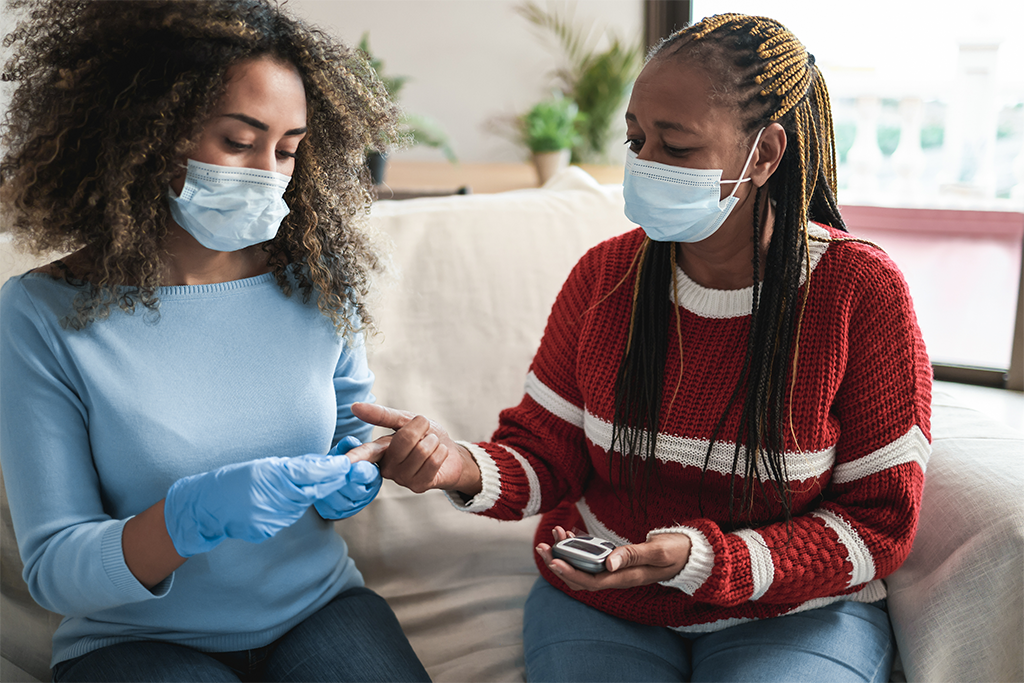Many prospective and experienced nurses are unaware of how many exciting career opportunities exist outside of bedside nursing. While the skills you gain through delivering patient care at the bedside provide an excellent foundation for your nursing practice, these skills are also easily transferable into a variety of other unique nursing roles. Looking to work away from the bedside? Wondering about BSN nursing career options?
Here are five BSN-required, non-bedside nursing careers that are worth exploring.
Telemedicine Nurse
Telemedicine has been an essential part of American healthcare since the 1980s. However, significant improvements in technology and recent stay-at-home orders have poised telemedicine for accelerated success on a long-term scale.
A telemedicine nurse is an RN who uses technology to care for patients from a remote location. The main objective is to educate, counsel, and assess patients through a phone call or video conference. Despite concerns that telehealth nursing may be impersonal or less effective, studies have shown that the opposite is true.
Telehealth nursing allows nurses to provide care with increased convenience and efficiency. These nurses can also help reduce healthcare costs, increase patient access to care, and improve patient involvement in their healthcare.
Telemedicine nurses work in a variety of settings, including doctors’ offices, hospitals, prisons, and clinics. In some cases, they are even allowed to work from home as long as they have access to a quiet and private office area for communication with patients. Types of telehealth nursing include telephone triage, advice, urgent care, and physician office.
Essential qualities of a telehealth nurse include:
- Excellent communication, listening, and assessment skills
- A desire to work outside of in-person patient care
- Adaptability to working with different technological platforms
- A friendly, calm demeanor
- A clear speaking voice
Other considerations about telehealth nursing include:
- You will have less face-to-face interaction with patients and other medical providers and may be working alone up to 100% of the time.
- You may have more flexibility with hours. Telehealth nurses typically work anywhere from four to eight-hour shifts.
- The ability to speak a second language can potentially open the door for more career opportunities.
- The position requires limited physical movement, serving as an ideal option for nurses with an injury or those who prefer not to be on their feet during long shifts.
Employers seek to hire telemedicine nurses with a BSN or higher. This is because BSN achievers gain a higher level of communication, critical thinking, and leadership skills in their studies – all of which are necessary to be a capable telehealth nurse.
Telehealth is growing 53 percent faster than any other type of medical care, which will continue to create an abundance of career opportunities for years to come. It’s a fantasy BSN nursing career away from the bedside.
Diabetes Nurse
Over 10 percent of the American population has a diabetes diagnosis. As a result, there is a rapidly growing need for more diabetes nurses to provide individualized care and education.
Diabetes nurses often work in the hospital setting and may see anywhere from four to twelve diabetes patients throughout their shift. Some patients may be newly diagnosed, while others have a history of diabetes. Therefore, the level of education and time involved with each patient can vary significantly.
A diabetes nurse may also work in patient’s homes to ensure that the patient can successfully manage their diabetes outside of the healthcare setting.
Here are a few typical daily duties of a diabetes nurse:
- Provide diabetes education and develop a self-managed plan of care for discharge.
- Educate the caregivers or family members who will be helping with the patient’s diabetes management.
- Provide attainable diabetes management goals.
- Assess patients to determine compliance and set up future reassessments as needed.
- Document patient visits, including interventions, education, and outcomes.
Diabetes nurses typically begin their careers as a bedside or staff nurse. After gaining a few years of experience providing direct patient care at the bedside, nurses have the necessary expertise to take on the role of a diabetes educator for patients with both type 1 and type 2 diabetes. After an R.N. obtains at least two years of experience or the equivalent of 1,000 hours of direct patient experience in diabetes care, they are eligible to sit for the exam to become a Certified Diabetes Educator (CDE). This certification is valid for five years.
Employers require a diabetes nurse to hold a minimum of a BSN. This is because the BSN curriculum teaches the necessary competencies essential for diabetes nurses to excel in the role. Critical skills include maintaining a great bedside manner, excellent communication skills, ongoing patience, and a strong desire to educate patients on long-term health habits.
If this is a career you are interested in pursuing, but currently only hold an ADN, you will want to complete an R.N. to BSN program before applying.
Emilie Cloutier, a BSN-prepared pediatric diabetes educator, living with type 1 diabetes herself, shares more information about her experience working one-on-one with the disease. Cloutier says that she loves her career and that the best part of being a pediatric diabetes nurse is “helping my patients make positive changes, no matter how small.”
School Nurse
A school nurse’s primary responsibilities are to treat students for illnesses or injuries and assist with medication administration, such as antibiotics or insulin. School nurses also have the opportunity to provide health and nutritional guidance to students, which is imperative for young learners to understand during their formative years.
Today, many schools also require nurses to support students in managing their mental health and providing additional resources. The best school nurses strive to keep students healthy so that they can continue learning in the classroom.
Here are a few additional duties of a school nurse:
- Providing education around hygiene
- Conducting physicals for sports
- Delivering nutritional education
- Assisting with or applying medication
- Assisting with minor injuries such as rashes, bee stings, and sports-related injuries
- Helping students manage chronic health conditions
- Administering vision and hearing checks
- Promoting healthy behaviors and habits
A few general skills and qualities that are critical to success as a school nurse include:
- A desire to work with school-age children (pediatric nurses often transition well)
- A friendly and non-intimidating demeanor
- Excellent listening and assessment skills
- Strong nursing judgment
- Excellent organizational skills and attention to detail for record-keeping
- A caring nature
You will need to hold a BSN or higher to be considered for a school nurse role.
Opportunities in the school nursing field vary by location. LinkedIn is a great place to search for positions in your area.
School nurses are typically required to obtain certification through their state’s Department of Education and the Department of Health. A certification from the National Board for Certification of School Nurses (NSCSN) is also encouraged by most schools, but not always required.
For more information on a day in the life of a school nurse, read about Brenda L. Brooks’ experience as a district head nurse-teacher in Hudson Falls, New York.
Aesthetic Nurse
Aesthetic nurses provide cosmetic services and procedures to patients at a medical spa or doctor’s office. These services include laser skin treatments, injectable fillers, neurotoxin injections, and even tattoo removal.
As the aesthetics field expands, nurses who have obtained a BSN or higher have a competitive advantage. Botox and other injectable sales are also estimated to grow by at least 10 percent through 2025, which has sparked the need for more skilled cosmetic nurses.
The aesthetics field is a great option for nurses who desire a more traditional schedule or don’t want to work on weekends or holidays. The med spas and doctor’s offices where aesthetics nurses work are open five days a week between 9 and 5, with some med spas open on weekends. Aesthetics nurses also have the option to work either full-time or part-time, and some workplaces offer flexible scheduling as well.
Qualities that a great aesthetic nurse should have include:
- A passion for the cosmetic and beauty industry
- Strong customer service skills and a friendly disposition
- Attention to detail
- Interest in boosting the confidence and self-image of clients
- A steady hand for delivering injections and laser treatments
Although aesthetic procedures are considered elective, there is still a level of stress involved. Since the industry is growing rapidly, many offices are booked for weeks in advance. This results in limited downtime during the day. However, morale generally remains high as clients are there for cosmetic procedures and not underlying health conditions.
Nurse Skills Lab Instructor
Most nurse educators are required to obtain an MSN degree or higher. However, clinical skills instructors for certain ADN and BSN programs allow bachelor’s prepared nurses to teach in the skills lab setting. It is essential to research your state’s specific guidelines, as educational requirements vary by state.
Many U.S. cities also have a nursing educator shortage. This has put nursing programs in a position to hire a BSN for nurse instructor roles where they would normally prefer an MSN. (In these situations, there is usually an understanding on both sides that the candidate will return to school within a specified period of time to achieve an MSN).
Additionally, nurses with a BSN can teach in certain licensed vocational nurse (LVN) programs and medical assistant (MA) programs. This route can be an ideal option for nurses interested in exploring nurse education before investing time and money into obtaining an MSN or doctoral nursing degree. Teaching in these programs typically requires three or more years of experience working at the bedside.
According to the U.S. Department of Labor Statistics, employment projections for registered nurses are expected to undergo a healthy growth of 12 percent from 2018 to 2028. This has led to an increased demand for nurse educators to keep up with industry expansion.
Critical skills for success as a nurse skills lab instructor include:
- Excellent communication, assessment, and bedside nursing skills
- Strong experience precepting nurses in a hospital setting
- A passion for teaching
- Patience
As you pursue — or consider pursuing — an advanced degree, the BSN nursing career opportunities will continue to grow.
 Guest author Sarah Jividen, RN, BSN, SCRN is a second-career nurse, freelance writer, mother of two, and founder of Mother Nurse Love, a resource for busy mom RN’s. Her nursing specialties include emergency room, neuro/trauma, and critical care. In a rare moment of spare time, you might find Sarah practicing yoga, writing, or attending a local concert venue with her husband.
Guest author Sarah Jividen, RN, BSN, SCRN is a second-career nurse, freelance writer, mother of two, and founder of Mother Nurse Love, a resource for busy mom RN’s. Her nursing specialties include emergency room, neuro/trauma, and critical care. In a rare moment of spare time, you might find Sarah practicing yoga, writing, or attending a local concert venue with her husband.
Some links in this article were updated in October 2024.

